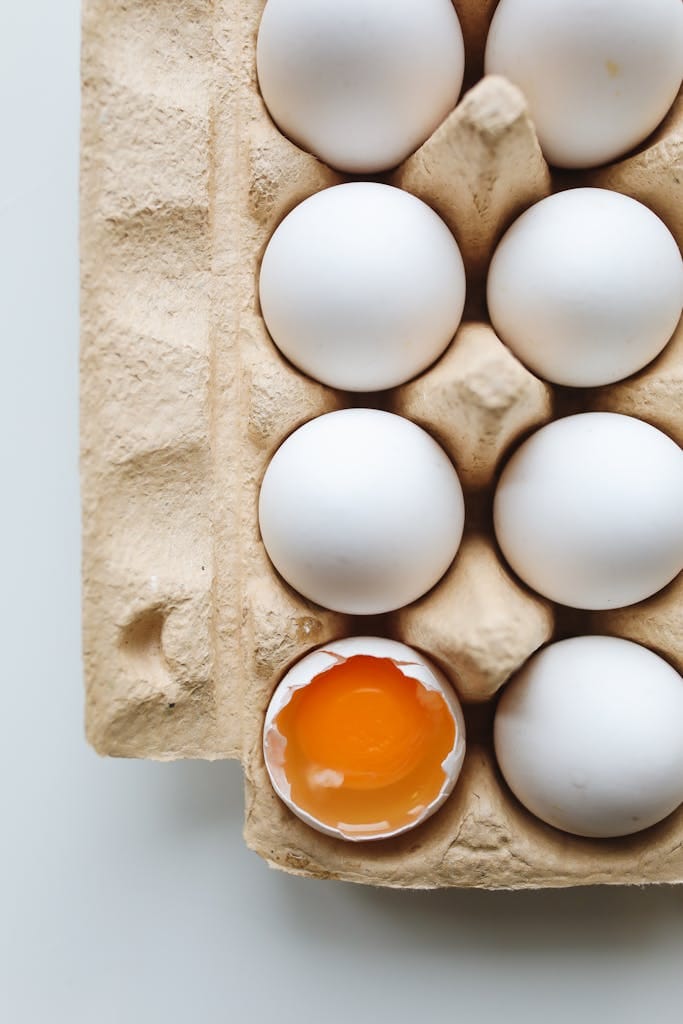FREE SHIPPING OVER $50
Your Egg Yolk’s Color Is Telling You Something—Here’s What You Need to Know
Cracked open an egg lately and noticed the yolk isn’t always the same shade? Some are deep orange, others pale yellow, and then there’s everything in between. But does the color of your egg yolk actually mean anything? Or is it just another food myth?
Spoiler: The color of your yolk does matter, and it’s telling you a lot more about the egg than you might think. Let’s break down what’s behind those shades and whether your breakfast choice is as nutritious as it looks.
What Determines Egg Yolk Color?

Many assume yolk color has to do with the type of bird or the freshness of the egg. In reality, yolk color is almost entirely influenced by the hen’s diet.
- Pale Yellow Yolks – Come from hens that eat a diet low in carotenoids, often grain-heavy (like corn and wheat).
- Golden to Deep Orange Yolks – Indicate a diet rich in carotenoid pigments from foods like marigold petals, alfalfa, or dark leafy greens.
- Reddish or Extremely Dark Yolks – Typically result from a diet that includes red peppers or other strongly pigmented plants.
Essentially, the more nutrient-dense the hen’s diet, the richer and darker the yolk.
Does a Darker Yolk Mean a More Nutritious Egg?
Yes—and no. While yolk color can signal a better diet, it isn’t the only factor that determines nutritional value. However, studies show that eggs with darker yolks often contain:
- More Omega-3s – If hens are pasture-raised and eat plants rich in omega-3s, their eggs will have higher levels of this essential fatty acid.
- Higher Vitamin A Content – Carotenoids (like lutein and zeaxanthin) in dark yolks are precursors to vitamin A, which supports vision and immune health.
- More Antioxidants – Lutein and zeaxanthin (commonly found in orange and red vegetables) are naturally deposited in the yolk, supporting eye health and reducing inflammation.
However, just because an egg yolk is pale doesn’t necessarily mean it lacks nutrients. It just means the hen’s diet was lower in carotenoids.
What About Pasture-Raised vs. Conventional Eggs?
One of the biggest factors influencing yolk color is how the hen was raised:
- Pasture-Raised Hens – These hens roam outdoors, foraging for grasses, bugs, and nutrient-rich plants, resulting in darker yolks.
- Cage-Free or Conventional Hens – Often fed a grain-based diet with minimal carotenoid-rich foods, leading to lighter yolks.
Research from Penn State University found that pasture-raised eggs contain up to twice the vitamin E and long-chain omega-3 fatty acids compared to conventional eggs.
Are Store-Bought Eggs Dyed to Look Healthier?
Some commercial egg producers add synthetic pigments to feed to enhance yolk color artificially. This is especially common in mass-produced eggs, where hens are fed color-enhancing additives (like marigold extract or paprika) to make yolks appear richer.
While this isn’t necessarily harmful, it can be misleading—a deep orange yolk doesn’t always mean the egg is healthier if the diet itself is still low in other nutrients.
How to Choose the Best Eggs
When buying eggs, don’t just go by yolk color—look at these factors too:
- Opt for Pasture-Raised or Free-Range – These eggs tend to be more nutritious because the hens have access to natural foods.
- Check the Omega-3 Content – Some eggs are specifically labeled as high in omega-3s, meaning the hens were fed a diet rich in flaxseeds or fish oils.
- Read the Labels Carefully – Terms like “cage-free” don’t necessarily mean the hens had outdoor access. “Pasture-raised” is a more reliable indicator.
- Look for Local Farm Eggs – If possible, buy from local farms where you can verify the conditions the hens are raised in.
Does Yolk Color Matter?
Yes, yolk color matters—but it’s not the only thing that determines egg quality. Darker yolks often signal a more nutrient-rich diet, but what truly matters is how the hens were raised and what they ate overall.
If you want the most nutritious eggs, choose pasture-raised options with a diet rich in natural plants and insects.
Related Articles
- This High-Protein Breakfast Can Help Lower Your Cholesterol—Dietitians Swear By It
- Not All High-Protein Yogurts Are Created Equal—Here’s the Best (and the Absolute Worst)
- The #1 High Protein Ingredient You Should Be Adding to Your Breakfasts, According to a Dietitian
- These 20 High-Protein Foods Are Basically Muscle in Edible Form
- Stop Guessing: This Is Exactly How Much Protein You Need to Lose Weight







